 Infinity Dental Care
Infinity Dental Care
Dental Implants – Hillsboro, OR
Come Get Your Teeth Back
Come Get Your Teeth Back
Whenever a patient who is interested in replacing their missing teeth comes to see us, our first recommendation is usually dental implants. Why? Because they simply offer the best solution any way you look at it. They’re extremely strong, durable, and they have the most natural appearance compared to all other options. They can be used to replace any number of teeth for a lifetime to come, and thanks to our dentists’ collaborative approach, we’re one of the few dental offices in the area that can complete the entire treatment in one convenient location.
Why Choose Infinity Dental Care For Dental Implants?
- #1 All Dental Implants Placed In-Office, No Need to Travel to Other Offices
- #2 Dental Treatment Plans Put Together with Sophisticated X-Guide Technology
- #3 Custom-Made Dental Restorations to Replace Any Number of Missing Teeth
What Are Dental Implants?
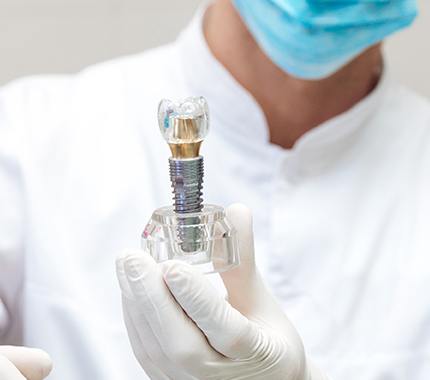
If you’ve lost one or more teeth, you can choose a treatment that closely imitates your natural tooth structure. A dental implant is the only solution to replace more than what’s visible from the surface — it replaces the roots of the missing tooth or teeth as well. As a result, you’ll enjoy a solution that looks and feels natural, while also having the potential to last for decades with the right aftercare.
Dental implants replace missing teeth both above and below the gumline with three main components:
- Implant Post:A titanium implant post is surgically placed into your jawbone to act as a new root. This stimulates your jaw, allowing your bone to fuse to it through a process called osseointegration. It provides the secure foundation your new smile needs to thrive.
- Abutment:After your jawbone has healed, you’ll need a second minor surgery to attach an abutment to the post. This is a connector piece between the restoration and the implant.
- Dental Crown:All-ceramic material is used to create a crown, bridge, or denture that matches your natural teeth to blend in seamlessly when you smile.
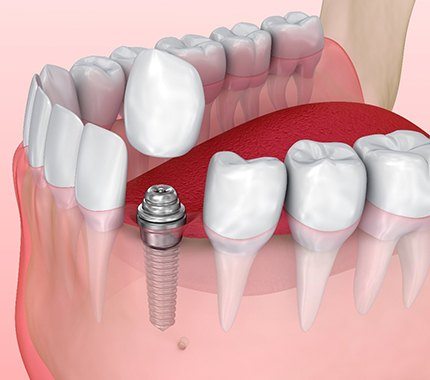
The 4 Step Dental Implant Process
Rebuilding you smile with dental implants requires a much different process than dentures and dental bridges. In fact, it’s a multistage treatment that takes place over several months! At Infinity Hill Dental, we’ll be with you every step of the way so that you can always feel confident on your journey towards a full set of pearly whites. Take the first step by contacting our office and scheduling a consultation today! In the meantime, read on to learn more about the four main steps of dental implant treatment.
Initial Dental Implant Consultation

Once you know that you’re going to be living with empty space in your mouth, you should immediately start considering your options. Are dental implants a good replacement for your missing tooth? To answer that question, you’ll need to schedule a consultation with your implant dentist at Infinity Hill Dental. We’ll use X-rays and other tools and techniques to fully examine your mouth; we’ll also need to consider the overall state of your oral health as well as your financial situation. Many times, a patient will need to complete preliminary treatments like bone grafts or gum disease therapy before moving onto the next step of dental implant treatment.
Dental Implant Surgery
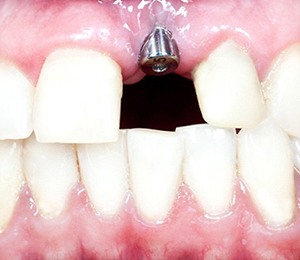
If you go to your typical dental office to get dental implants, the first thing they will do is refer you to an outside specialist to have your new roots placed into your jawbone. Instead, at Infinity Dental Care, we bring the specialist to you! Dr. Kalluri who has performed the implant procedure countless times, and she always does it using X-Guide technology. This allows her to come up with extremely precise treatment plans for each patient using a digital 3D model of their teeth and jaw. Thanks to our all-in-one approach, we’re able to save patients time, money, and stress compared to your average dental office.
When you come to our office on your scheduled surgery date, Dr. Kalluri’s first priority will be to make you comfortable in the dental chair. In addition to numbing your mouth with local anesthetic, she may use sedation dentistry to ensure your comfort. The first step of the surgery is to make a small incision (or several, depending on how many dental implants you need) in the gums to access the jawbone. The dental implant post is inserted into the jawbone in a precise, pre-determined location. Then, the gums are close, a protective cap is placed over the implant post, and you’ll be sent home to begin the healing process.
Dental Implant Osseointegration& Abutment Placement
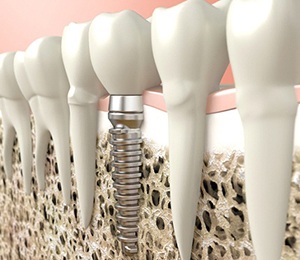
Dental implant posts are typically made of titanium, which is a biocompatible material that is well-known for its ability to fuse with bone. Once the implant post is in your jaw, it will gradually begin to integrate with the surrounding bone tissue. This process is called osseointegration, and it can take anywhere from four to six months to complete. While this may seem like a long time, the end result is a strong, reliable foundation for your new teeth.
When the implant is firmly bonded with the jawbone, it’s ready to receive an abutment. This is a small connector that is secured to the dental implant and will eventually join it with your new crown, bridge, or denture. There are some cases where you can get an abutment at the same time as the implant post.
Delivery of Dental Implant Restorations
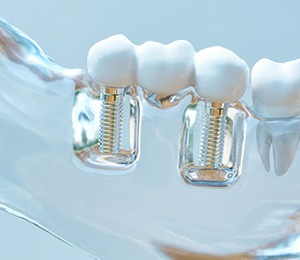
As your gums heal after abutment placement, your final restoration will be fabricated. This crown, bridge, or denture is designed based off impressions of your mouth and carefully crafted out of natural-looking dental porcelain. When we receive your final restoration, you’ll return to our office to have it secured to your dental implant(s). Once placed, your replacement teeth will blend in seamlessly with the rest of your smile! Once we’ve made sure that your bite feels comfortable and that you’re happy with the results, you’ll be ready to go out and enjoy your complete, confident smile.

Benefits of Dental Implants
Thanks to advancements in dentistry, you have more options than ever to replace your missing teeth. Although there are several solutions, only one offers exceptional benefits above all the others. Dental implants are a nearly perfect replica of your tooth’s natural structure. As a result, it provides several advantages that you simply can’t achieve with other replacement options like dentures or dental bridges!
Day-to-Day Benefits

Once your dental implants have completely healed, they shouldn’t feel any different from your natural teeth. You may even forget that they are implants! Here are some of the benefits that you can experience on a daily basis:
- Better Bite Force: When you get dental implants, your bite force can be replenished by 90% or more! This is much more than what you can achieve with dental bridges or dentures.
- Simple Maintenance: Caring for dental implants is just like caring for your natural teeth. You should brush twice, floss, and rinse with mouthwash every single day. Continue to schedule regular cleans and checkups with your dentist.
- Increased Confidence: If you’ve lost a tooth or two in the front, it’s easy to feel embarrassed by your mouth. You don’t need to hide behind an incomplete smile. An all-ceramic restoration will fill the empty space. The restoration is carefully crafted to match the appearance of your natural teeth to blend in when you smile. No one will know it isn’t your real tooth.
Health Benefits
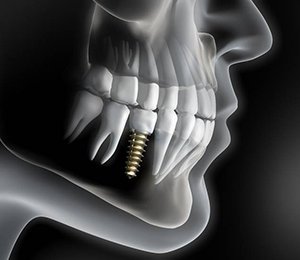
Dental implants have a positive influence on health. Here are some of the ways that your body will benefit:
- Prevents Bone Loss: When you lose a tooth, the root is also missing. The lack of stimulation will cause your jawbone to slowly shrink. A dental implant is the only prosthetic to stop bone loss because it replaces the root. The implant post encourages new growth to preserve your jawbone’s density.
- Improved Dental Health: When you’re missing teeth, you will eventually experience other oral health issues, such as cavities, gum disease, and additional tooth loss. Dental implants can prevent these negative effects of tooth loss.
- Better General Health: Your dental health and general health go hand in hand. It can even reduce your risk of life-threatening health problems, like diabetes and heart disease.
Long-Term Benefits

Dental implants cost more than traditional dentures and dental bridges, but there is a good reason for this. They are an investment in the future of your smile! Here are some of the long-term benefits of dental implants:
- Long-Lasting: Traditional dental prosthetics need to be replaced every few years, but implants can last for decades with the right aftercare, like maintaining your oral hygiene and receiving routine services from your dentist.
- Save Money: Traditional dental prosthetics need to be replaced every few years, which can be costly over time, but since dental implants are permanent, you should never need to pay to have them replaced. They also improve your oral health to reduce your overall dental expenses in the long run.
- Successful: Dental implants have an astonishing success rate of over 95%! Dental implant failure is highly unlikely.

Who Dental Implants Can Help
If you have one or more missing teeth, you’re likely a candidate for dental implants as long as you have good oral health and adequate jawbone density. Even if you’re not a good candidate for dental implants at first, we can help you become one with treatments like bone grafting or gum disease therapy! During your initial consultation, Dr. Kalluri will review your medical history and take a CT scan of your mouth to look for any concerns that could threaten the success of your dental implant.
If Dr. Kalluri finds an issue, it doesn’t automatically disqualify you from the treatment. Instead, we can help you plan out additional treatments to create the right foundation for your new smile. Then, once Dr. Kalluri has determined that dental implants are a good choice for you, she’ll create your treatment plan based on the number of teeth you’re missing.
Who Is a Good Candidate for Dental Implants?

Generally speaking, dental implants are an excellent choice for anyone missing one, several, or all their natural teeth. Since they replace the tooth’s roots as well as its crown, they’re the healthiest tooth replacement option available. You’ll typically need three things to be a good candidate for dental implants:
- Good overall health: You’ll need to be well enough to undergo minor surgery to have your dental implant placed.
- Excellent oral hygiene:Oral health issues like tooth decay or gum disease threaten the success of dental implants, so they’ll need to be addressed before your treatment.
- Adequate jawbone density:If you don’t have enough jawbone density, the dental implant posts won’t be able to form a strong foundation and are more likely to fail.
If you don’t meet one or more of these criteria yet, come see us for a consultation anyway! We offer a variety of services that may be able to help you overcome your obstacles and get ready for your brand-new smile.
One of the best things about dental implants is that they are so versatile. No matter how many teeth a patient might be missing, they can be used to give them a strong and attractive smile:
Missing 1 Tooth
A dental implant root and the custom-made dental crown can be positioned between two healthy teeth without them needing to be altered at all. This is a more conservative approach compared to a traditional bridge in which the surrounding dental structure has to be filed down in order to support the prosthetic.
Missing Multiple Teeth
If you’re missing more than a single tooth in a row, we may recommend an implant-retained bridge. Traditional bridges require that we alter your natural healthy teeth in order to use them as anchors to hold your replacement in place. With an implant bridge, your natural teeth will be unaltered, and the bridge will be stronger when it’s attached to your jawbone.
Missing All Teeth
All it takes is just four to six well-placed implants to restore an entire row of teeth with a custom-made full denture. This is much more cost effective than replacing each tooth with individual implants, plus implant dentures give patients a much stronger bite compared to regular removable ones.

Understanding the Cost of Dental Implants
The cost of the dental implant procedure can vary quite a bit from patient to patient depending on how many implants they need, where they are located in the mouth, and what kind of restoration is used. The price can also vary depending on if a patient needs a referral for surgery. Fortunately, at Infinity Dental Care, we can perform the entire procedure in-house from start to finish. Despite their higher upfront cost compared to regular bridges and dentures, they actually tend to help patients save money overall thanks to their longevity. While more traditional treatments typically need to be completely redone every five to seven years, compounding their cost, dental implants can easily last for the rest of a patient’s life, meaning they’ll spend thousands less in periodic maintenance.
If you are looking to learn more about the cost of dental implants in Hillsboro, our team at Infinity Dental Care is here to explain:
Preliminary Treatments & Dental Implant Surgery

As part of your initial consultation with Dr. Kalluri, she will examine your oral cavity and facial structures to determine if you are eligible for treatment. If so, you’ll move to schedule your implant surgery; however, should she find problems early on, it may be necessary to undergo preliminary treatments. Bone grafting, periodontal therapy, or tooth extraction may be required to ensure a healthy and stable environment for your implants, and you can expect them to add to the total cost of your treatment.
Also, your dental implant surgery will incur its own cost. But the good news is that you won’t need to worry about paying an outside specialist because the entire procedure is performed in-house. Your implant dentist in Hillsboro will take care of you from the consultation to your customized restoration placement. This makes paying for treatment much less cumbersome in the end.
The Parts of Your Dental Implant

There are many types of dental implants on the market. With different brands and manufacturers, it can raise or lower the price of your treatment more than you realize. But these are not the only contributing factors. You must also consider the size and material of the implant as well as how many you will need to replace your missing teeth. Naturally, a single tooth dental implant will cost much less than having 4-6 along a row that is designed for an implant denture. The location of your implants tends to determine their size, which is incorporated into the cost, as well as whether you have titanium or zirconia implants put into place.
No matter the style, size, or brand of dental implants in Hillsboro, you can trust our team to be transparent and honest when it comes to explaining the parts of your implant and how it will affect the total cost.
How Dental Implants Can Save You Money

By choosing to replace your missing teeth with dental implants, you may be surprised to learn that they are much more cost-effective than you might think. Yes, traditional dentures and bridges are less expensive upfront; however, their maintenance can become costly over the years.
With dental implants, you don’t have to worry about regular adjustments or replacements every 5-10 years, you don’t need dental adhesives to hold them in place, and you won’t require specialized cleaning solutions to maintain them. You will also discover that dental implants make it easier to ensure better oral health because of their ease of cleaning. As a result, you can lower your risk for many of the most common health conditions and systemic diseases, all of which can be costly as you receive treatment throughout your life.
Does My Dental Insurance Cover Dental Implants?

It’s important to note that most dental insurance providers won’t cover implants because they still consider them a cosmetic service. However, it’s still worth it to call to check because more companies are beginning to incorporate coverage for eligible patients. No matter how your dental insurance chooses to handle your dental implant surgery, your preliminary treatments may be covered by your dental benefits as well as sedation, restoration, and initial consultation. Our team at Infinity Dental Care will work to help you maximize your benefits and save the most money throughout your dental implant treatment.
Making Dental Implants Affordable

If you need help to pay any remaining balance after filing with your dental insurance, we are pleased to work closely with CareCredit. This third-party financier offers flexible solutions in the form of low and no interest payment plans. By allowing you to break up the cost of your treatment into manageable monthly payments, you can rest easier knowing you are well within your budget while working toward a healthier, longer-lasting smile.
As you start the process of dental implant placement, trust that our team will be with you every step of the way. Contact us to schedule an appointment and let us provide the information you need to make the right choice for your dental health.

Dental Implant Failure and Salvage
Even though the risk of a dental implant failing is low, you should be prepared to call us immediately if you notice any issues with your newly restored grin, such as unusual pain or implant posts that have come loose. The sooner we examine your mouth, the sooner we can figure out what has gone wrong with your dental implants and how the problem can be addressed. We’re ready to take whatever steps are needed to help you protect your smile.
Advanced Dental Implant Procedures
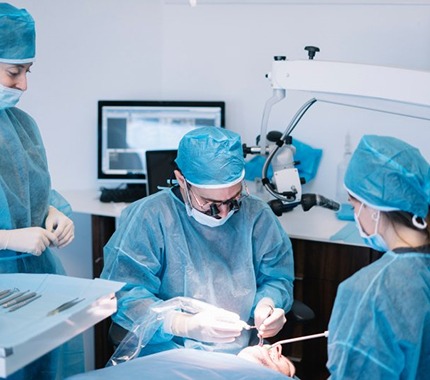
One of the most important things necessary for dental implants to work is a strong and healthy jawbone. This is what will allow your restorations to remain stable and lifelike for decades. However, sometimes the jawbone may need some help to strengthen it so that your new smile can last. That’s why our team offers advanced dental implant procedures to ensure successful results. Here are some of the treatments we provide and what you can expect from each.
Bone Grafting
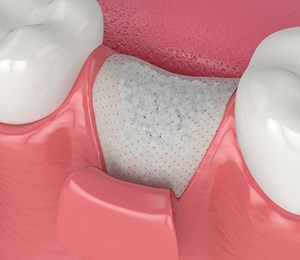
Your jawbone’s density is the most essential part of the dental implant process, as this is what will hold your new pearly whites in place for many years to come. But what if you don’t have enough bone tissue in the area that needs tooth replacements? This is where bone grafting comes into play. Our team will evaluate your jawbone to see if there’s sufficient mass. If not, we can use bone minerals from a donor or another part of your body to place in your jawbone. After we close the area up, it can take a few months for your new bone tissue to integrate and solidify. Once it’s completely fused with the rest of your jawbone, you’ll be ready for dental implant placement.
Sinus Lift
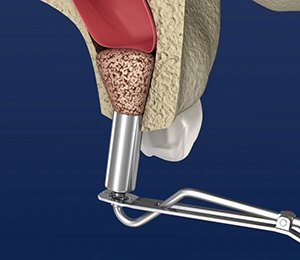
This procedure is similar to a bone graft in that it involves adding more density to the bone tissue. However, this is reserved for those who require dental implants in the back of the mouth on the upper arch. If there isn’t enough bone density to hold the titanium post, the implant can end up sticking into the sinus cavity. For this reason, we can perform a minor procedure to lift the sinus and add bone grafting material in the area. After several months of recovery, the new tissue should integrate successfully, increasing the success rate of your dental implants.
PRP/PRF Treatment
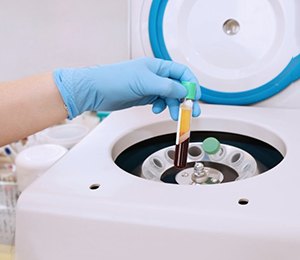
Your recovery period is incredibly important after undergoing dental implant surgery. To make your healing process smoother and more comfortable, we can perform PRF/PRP treatment. This involves extracting some of your blood before performing your surgery and preparing it in a centrifuge. After finishing your procedure, we’ll apply your blood around your implant sites. This will promote faster healing as well as significantly reduce the risk of discomfort and infection while you recover.
Ridge Expansion
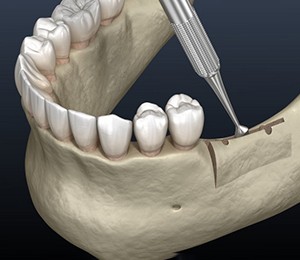
Sometimes the jawbone isn’t wide enough to properly support dental implants. If this is the case, we may have to perform a ridge expansion. This is when we use a special drill to accurately divide the bone into inner and outer sections in the specific area where your dental implants will go. The wedge will then be filled with grafting materials to help expand the area and increase the density of the jawbone. After you’ve successfully recovered, we can move forward with performing your dental implant placement procedure.
Dental Implant Technology
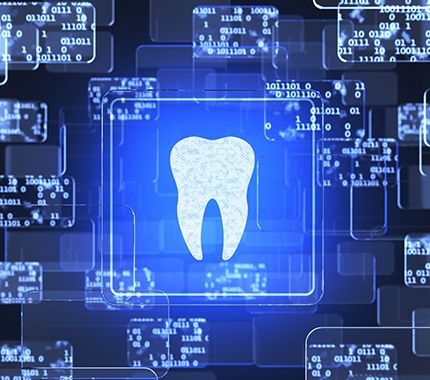
Dental implants provide all sorts of benefits that you can’t achieve through traditional dentures and dental bridges. With modern dental technology, dental implants have an astonishing success rate of over 95%! Here are some of the advanced dental implant technologies that we use during the dental implant process.
3D Cone Beam Imaging / 3D CT Scanning
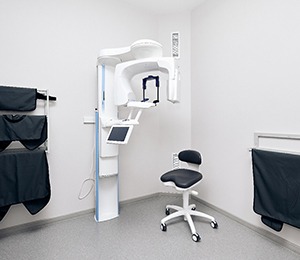
Dental X-rays help us to see the oral structures in your mouth that are typically hidden. This includes the roots of your teeth and your jawbone. However, they aren’t able to capture everything. We will map your mouth with the 3D cone beam CT scanner. This piece of technology helps by showing us important details that aren’t completely clear with digital X-rays. This includes nerve pathways, blood vessels, and the thickness of your jawbone. By using this scanner, we can carefully plan where your dental implant should be placed for the best chance of success.
Guided Dental Implant Surgery
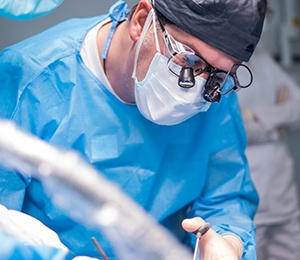
Using the CBCT scan of your mouth, we can create a 3D-printed surgical guide. This will help to give us a clear indication of where your dental implants need to be inserted into the jaw. This enhanced precision provided by the guide can make your treatment noticeably more comfortable and reduce any associated swelling and bruising. Treatments performed with a surgical guide tend to require smaller incisions which means that your gums will need less time to recover.
Antibacterial Coating

As previously stated, dental implants have an incredible success rate. However, we still take every step we can to prevent complications and dental implant failure. That’s why we use antibacterial coating for implants and restorations. This helps to keep bacteria away from the surgical site as it heals. This is essential for the successful fusing of your dental implants and jawbone. It’s important to continue maintaining an excellent oral hygiene routine, but this antibacterial coating can help a lot to prevent infections.
Digital Impressions System
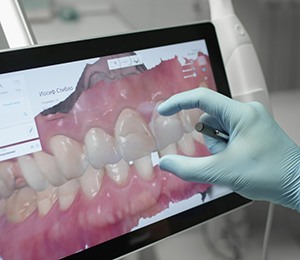
If you have had impressions taken in the past, it probably wasn’t the most comfortable experience. The putty used to make impressions can be very uncomfortable in your mouth. Digital impressions are much easier to take, producing highly accurate and reliable images. This simplifies the process of creating high-quality restorations customized just for you!
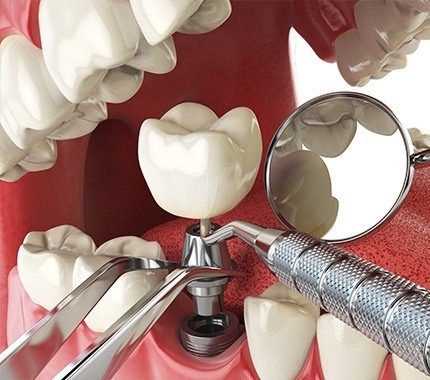
Dental Implant Post-Op Instructions
As with any oral surgery, you’ll likely feel a little discomfort as the anesthetic from your treatment begins to wear off. Thankfully, managing your symptoms after surgery shouldn’t be very difficult. Before you leave, we’ll give you a detailed list of how to navigate your recovery and manage your symptoms, which typically includes resting, applying an ice pack or cold compress, and staying hydrated.
What to Do Directly After Dental Implant Surgery

While dental implant surgery is a relatively simple procedure, it is still a minor surgery. Therefore, it’s important that you take some time to rest to allow your body to heal. You should plan on taking the day of your surgery off, as well as one or more days afterwards. To help speed your recovery along, make sure to:
- Take your prescribed pain relievers as instructed
- Refrain from strenuous activity for a few days
- Avoid drinking from a straw or spitting forcefully
- Do not touch the surgical site with your fingers or tongue
Common Side Effects After Dental Implant Surgery

If you’ve never had an oral surgery before, you may be unsure of what to expect symptom-wise. It’s normal to experience some slight bleeding, swelling, and bruising for a few days after your procedure. These should all be easily manageable with gauze, ice packs, and over-the-counter pain relievers before they fade away on their own. If these symptoms continue to bother you, or your discomfort doesn’t seem to be easing, call us right away and we’ll help you overcome these issues.
Your Diet After Dental Implant Surgery

To keep from irritating the surgical site, it’s important that you adjust your diet for several days or weeks after your dental implant surgery. Generally, you should stick to soft foods that aren’t too hot or acidic. A few popular choices we recommend include:
- Mashed potatoes
- Soup (that isn’t too hot or spicy)
- Pasta
- Scrambled eggs
- Yogurt
- Applesauce
- Pudding
- Smoothies
- Ice cream
Health & Oral Hygiene After Dental Implant Surgery

As with any surgery, it’s incredibly important to keep the surgical site clean while you heal. This is essential for helping your dental implant successfully integrate into your jawbone. Here are a few important oral health tips to keep in mind:
- Continue to brush and floss your teeth normally, just be careful around the surgical site.
- Rinse your mouth out with saltwater or a prescription mouthwash several times a day.
- Avoid mouthwash that contains alcohol
What to Do After Your New Teeth Are Attached

Once you’ve healed and your dental implants are fully fused with your jawbone, it’s time for the last step of your dental implant treatment: having your replacement teeth attached! During this last appointment, your custom-made crown, bridge, or denture will be secured in place. At first, you may experience some slight sensitivity, but this should be easily managed and fade quickly. Then, you’ll be ready to go out and show off your brand-new smile!

Maintaining & Caring For Your Dental Implants
The average lifespan of dental implants is usually upwards of 30 years after the surgery has been performed. Hence, you can rely on your implants to eat and speak comfortably at home and around others for many, many years. To get the absolute most out of implants, it’s important to practice good maintenance and care on a regular basis. The steps listed below will help keep your implants safe from damage and infection; contact our office if you would like additional advice.
Making Oral Hygiene a Priority

When the gum tissue around dental implants becomes infected, it can lead to peri-implantitis, a condition that’s similar to gum disease. Peri-implantitis leads to bone loss and implant failure when left untreated. In order to avoid an infection, keep the implant, the restoration it supports, and the area around it clean with regular brushing and flossing. As an added precaution, you can rinse with an ADA-approved mouthwash to kill much of the harmful bacteria remaining in your mouth.
Eat a Healthy Diet

Dental implants have virtually no limit in what they allow you to eat, and there’s nothing wrong with enjoying a piece of cake or another sweet treat every once in a while. Eating nothing but sugar and starch, however, could eventually lead to problems with your dental implant and the rest of your mouth. Make sure your diet contains a wide variety of nutritious foods, including those rich in calcium and Vitamin C that help promote a strong jawbone and gums that can resist infection.
Break Bad Habits

Smoking is a major risk factor for peri-implantitis. You should stop using any and all tobacco products before implant surgery is performed; try looking online for resources that can help you give up cigarettes. Also, be wary of any habits that can inflict physical damage on your dental implants. That includes chewing on the ends of pens or pencils, tearing open packages and envelopes with your teeth, and crunching on ice or anything else that’s hard. If you feel tempted to chew something on a regular basis, try keeping a pack of gum on hand at all times.
Protect Your Dental Implants

Even the strongest dental implant can break due to a powerful impact or constant exposure to excessive amounts of pressure. If you play sports or grind your teeth at night, a mouthguard could be essential for protecting the investment that your dental implants represent. A mouthguard acts as a barrier that separates your dental implant and your teeth from the point of impact, thus keeping the damage to a minimum. It can also stop the upper and lower rows of teeth from making direct contact with each other in order to protect your implants from the effects of bruxism.
Schedule Regular Dental Checkups

Even with the best home maintenance routine, you should still have Dr. Kalluri examine your implants during your six-month checkups. Some problems start so small that you might miss them on your own, but having them diagnosed early could make all the difference in the world.

Dental Implant FAQs
There is no doubt that dental implants are worth the time and monetary investment that they require. However, before you commit to them or request your consultation with us, it is only natural if you would like to learn more about the journey ahead of you. That is why we have compiled the following brief list of frequently asked questions. If you do not see the information you were hoping for, you are welcome to contact Infinity Dental Care directly.
Is Dental Implant Surgery Safe?
At Infinity Dental Care, we utilize the latest technology and techniques in dentistry at our office such as CEREC digital impressions and Calaject, an alternative anesthetic for pain-free treatment. This allows us to provide patients with the highest quality care along with added comfort and accuracy when it comes to crafting their restorations. We also utilize a program called X-Guide that allows Dr. Kalluri to place a patient’s implants with maximum precision, leaving nothing to chance.
Using the latest and greatest dentistry has to offer, you can rest assured knowing that your smile is in highly capable hands. At our state-of-the-art facilities, you’ll be able to look forward to a stress-free and smooth procedure that will restore your ability to eat, speak, and smile with confidence again.
Is It Painful to Get Dental Implants?
You should feel little to nothing during your implant placement surgery. However, swelling and soreness are normal in the days following the procedure. Pain relieving medications, as well as careful adherence to postoperative instructions, will minimize any discomfort you feel. Many patients remark at that the entire treatment experience is more comfortable than they anticipated.
How Can I Prepare for Dental Implant Surgery?
If you smoke, you should quit at least a week or two before your surgery; tobacco products can compromise your body’s ability to heal after surgery. You should also stock up on soft foods. Smoothies, applesauce, and brothy soups are all good choices. It’s even okay to indulge in a little ice cream. We will give you additional preoperative instructions according to your unique circumstances.
Will I Need to Get a Bone Graft Before Getting Dental Implants?
If you’ve been missing a tooth for a while, your jawbone will likely have deteriorated some without the circulation that was once stimulated by its roots. If your jawbone has begun to shrink, you may need to get a bone graft before you can move forward with the surgery. Either way, Dr. Kalluri will let you know during your consultation.
What Causes Dental Implants to Fail?
Dental implants boast an incredibly high success rate of 95 percent, but occasionally they do fail. Some common reasons this may occur include:
- Infection
- Failure to integrate with your jawbone
- Improper healing
Can I Take Dental Implants Out?
Dental implants are designed to be a permanent solution for tooth loss. Once the implant fixture has been integrated into your jawbone, only Dr. Kalluri will be able to remove it. However, there are removable models of implanted dentures if taking them out for cleaning is a concern. If a removable option is desirable, be sure to let our team know during your consultation.
Am I Too Young to Get Dental Implants?
We recommend that a patient be at least 18 years old or older before undertaking dental implant surgery. Younger patients’ jawbones are still in the process of developing and placing a dental implant could interfere. This can cause some complications like compromised durability, bite misalignments, and even bone loss. So, it’s best to wait until a young patient’s jaw has completely matured (sometimes as late as their mid-20s) before considering dental implants as a tooth replacement option.
How Long Does Dental Implant Surgery Take?
The length of your dental implant surgery depends on a number of factors including how many implants you’re receiving. In general, a single implant takes one to two hours to complete based on the position and complexity of the procedure. This includes the time it takes to administer anesthetics and prep your mouth for the surgery. Without taking the proper precautions, there is an increased risk of infection and implant failure. So, we do all we can to keep that risk to a minimum by carefully cleaning and preparing the procedure to the highest standards.
Preventive Dentistry Pediatric Dentistry Emergency Dentistry Restorative Dentistry Periodontal Therapy Dental Implants Cosmetic Dentistry Sedation Dentistry Wisdom Tooth Removal Advanced Services & Technology View Our Services